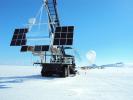Dark Matter Day
Unlocking cosmic secrets
October 31, 2023
Share
![Dr. Nancy Ross, Vice-Principal (Research) accompanies Queen's Emeritus Professor and Nobel Laureate Arthur McDonald, Minister François-Philippe Champagne, local Members of Parliament, and SNOLAB administration on their way to the facility 2 km underground to announce the Canada Foundation for Innovation's 2022 Major Science Initiatives Fund. [Credit: Gerry Kingsley; CFI]](/gazette/sites/gazettewww/files/styles/xsjpg1x3to2/public/2023-10/CFI%20MSI%20Announcement_1000x667_0.jpg?itok=8rxdUGtC)
Dr. Nancy Ross, Vice-Principal (Research) accompanies Queen's Emeritus Professor and Nobel Laureate Arthur McDonald, Minister François-Philippe Champagne, local Members of Parliament, and SNOLAB administration on their way to the facility 2 km underground to announce the Canada Foundation for Innovation's 2022 Major Science Initiatives Fund. [Credit: Gerry Kingsley; CFI]
Dark Matter Day is a globally recognized event dedicated to the pursuit of research and exploration around dark matter and its many enigmas. For nearly a century, astronomers have observed that galaxies move in unexplainable ways and hypothesized the existence of dark matter. While we now understand that dark matter makes up a staggering 85 per cent of the universe, it does not reflect or produce light – making it very difficult to identify.
Dark Matter’s gravitational effects are thought to be the glue that holds galaxies together. But the absolute proof remains somewhat elusive as research groups worldwide have, for decades, tried to directly observe dark matter and study its properties.
Today, the Gazette is highlighting recent stories that outline Queen’s role in the international hunt for dark matter and other cutting-edge research involving astroparticle physics and astronomy:
Dark matter mysteries: Since the 1980s, Queen’s has invested in developing the research infrastructure and expertise needed to allow breakthrough discoveries in astroparticle physics, the area of science investigating the building blocks of the universe and the objects within it, including dark matter.
The discovery of new polar ring galaxies: Queen’s researchers Kristine Spekkens and Nathan Deg are part of an international experiment that discovered two new polar ring galaxies. Understanding polar ring structures in galaxies offers insights into their evolutionary processes, including the possibility that mergers, where larger galaxies absorb smaller ones, may be more frequent than previously believed. They also could lead to new clues about the mysterious properties of dark matter.
Frozen Lab – chasing neutrino interactions in ice: At SNOLAB, 2km underground in Sudbury, Ontario, Queen’s researchers are leading experiments to advance our knowledge of dark matter and neutrinos – the tiny particles abundant in the universe but hard to spot because they rarely interact with matter. Thousands of kilometers to the south, in the middle of Antarctica, Queen’s is part of another international collaboration devoted to exploring the mysteries of outer space from right here on Earth. Queen’s physicist Nahee Park is chasing neutrino interactions at the IceCube facility at the South Pole.
Next chapters on neutrino science: For the first time, the SNO+ experiment housed at SNOLAB captured neutrinos produced in nuclear reactors hundreds of kilometers away using pure water. The SNO+ experiment is the evolution of the Noble-Prize winning SNO experiment led by Queen’s professor Arthur McDonald, which proved that neutrinos have mass.
A glimpse into cosmic choreography: A total solar eclipse is a unique cosmic event, where the Moon aligns perfectly between the Sun and Earth, casting a shadow on our planet. On April 8, 2024, this rare occurrence will take place in the city of Kingston, which falls within the narrow path of totality.
Dr. Robert Knobel, the Head of the Department of Physics, Engineering Physics, and Astronomy at Queen’s, is leading efforts to ensure that the campus and Kingston community can safely observe and learn from this celestial phenomenon.
Arthur B. McDonald Astroparticle Physics Institute: The McDonald Institute is Canada’s network for astroparticle physics research, uniting researchers, theorists, and technical experts within one organization. Located at and led by Queen’s University, the McDonald Institute has 13 partner universities and research institutes across the country, all of which are key players in Canada’s past and future innovation in astroparticle physics.
Featured Events:
High School Dark Matter Workshop
Saturday, Nov. 4
1 – 5 p.m.
The McDonald Institute and Queen’s are running a free afternoon workshop for high school students covering the essence of science, the astronomical evidence of dark matter, how particle detectors work and have led to our understanding of the standard model of physics. Learn more about the high school workshop.
Dark Matter Day: The Dark Side of the Sun
Saturday, Nov. 4
7 – 9 p.m.
Queen’s Physics, the McDonald Institute, and the Queen’s Observatory are hosting a talk by Professor Aaron Vincent about using the sun as a giant dark matter detector. This event will also feature activities and demonstrations, including tours of the Queen’s Observatory. Learn more about the talk with Dr. Vincent .
Cosmic Probes of the Dark Sector
Thursday, Nov. 9
11:30 a.m. – 12:30 p.m.
Dr. Chanda Prescod-Weinstein’s talk will focus on questions relating to large-scale structure and axion-like particle models, as well as on asymmetric dark matter in neutron stars as valuable exemplars of interesting work that is underway. This lecture will motivate the 2020’s focus on astrophysics and cosmology for determining what exactly dark matter is comprised of. Learn more about the lecture with Dr. Prescod-Weinstein.
Teaching to Transgress Series: Homo Narrans Through the Looking Glass of Dark Matter
Thursday, Nov. 9
3:30 – 5:30 p.m.
Dr. Prescod-Weinstein shares her love for physics, from the Standard Model of Particle Physics and what lies beyond it, to the physics of melanin in skin, to the latest theories of dark matter—along with a perspective informed by history, politics, and the wisdom of Star Trek. Learn more about the evening lecture with Dr. Prescod-Weinstein.

![[SNO+ detector at SNOLAB]](/gazette/sites/gazettewww/files/styles/xsjpg1x3to2/public/2024-04/McDonald-Institute-funding-1800x1200-Gazette.jpg?itok=6Lwe0LRj)

